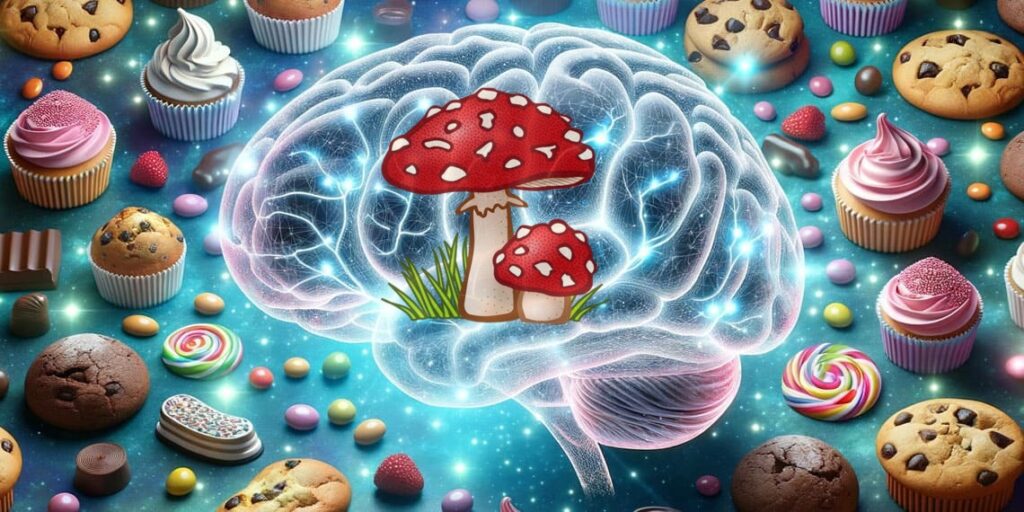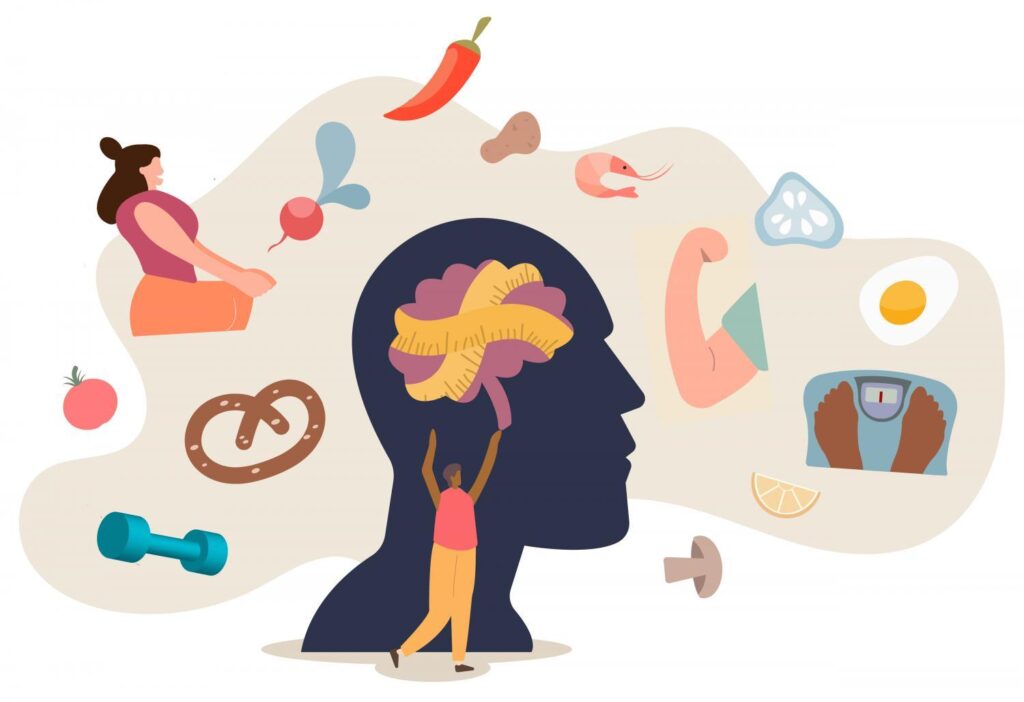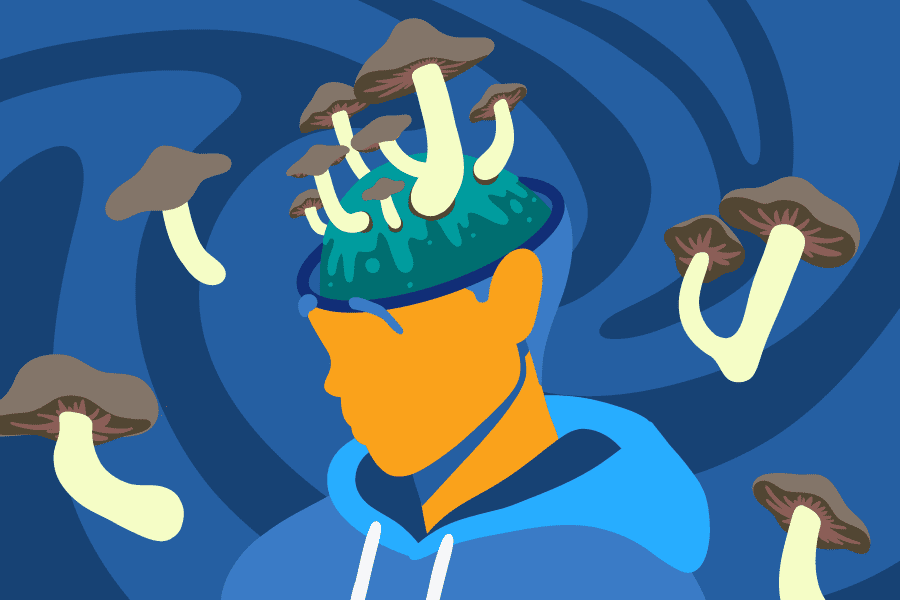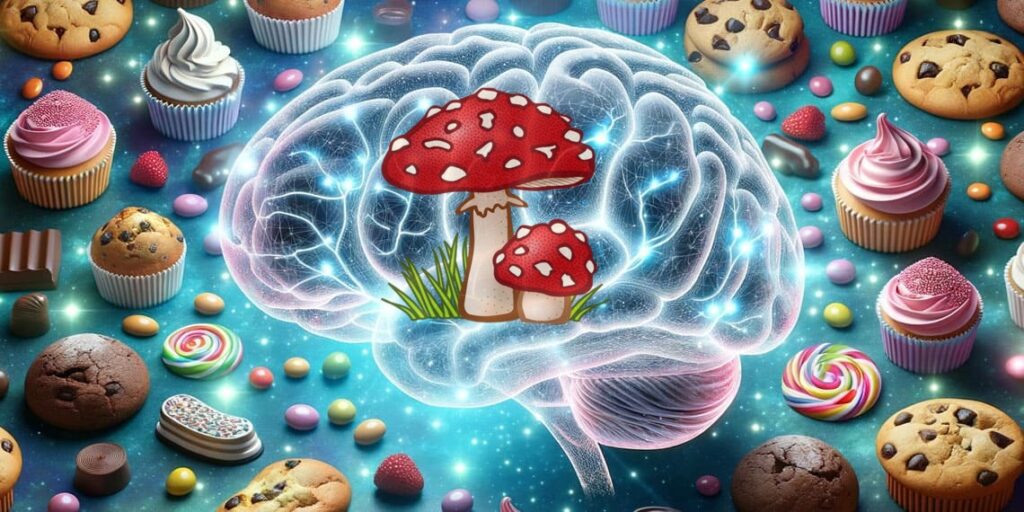
Understanding Eating Disorders
Some eating disorders (ED) exist on their own, but many individuals struggling with eating disorders can be dealing with multiple forms of disordered eating, and are often challenged with other mental health struggles.
Though, in most psychological work it’s understood that for people with an eating disorder, controlling food and controlling the body is often a way of relieving stress of feeling a sense of control over their life. Psilocybin studies are already underway for the treatment of many other control-seeking disorders such as substance abuse and OCD.
With emotional regulation being the driving factor for these maladaptive behaviors, researchers believe psilocybin’s power to promote neural plasticity could catalyze the ED recovery process by reconditioning reflexive responses to environmental changes.

Similar to addiction, binge eating disorder revolves around the idea of control. One feels that the substance, whether it be drugs, alcohol, or food, provides them with a sense of control over their life, that it helps them to cope. But when one is engaging with their substance of choice, they feel the opposite: absolutely powerless and out of control.
Not only is BED filled with suffering in the moment, but over time it can lead to various physical and psychological problems, including obesity, diabetes, heart disease, high blood pressure, depression, and more. In many ways, it can be life-threatening.
Generally speaking, those with BED experience body dissatisfaction, depression, anxiety, low self-esteem, and difficulty coping with feelings.
Traumatic events such as sexual abuse can also increase the risk of binge eating, with things like stress, poor self-image, social pressures to be thin, and the availability of preferred binge foods all being triggers for binging.
What causes binge eating disorder is much more complex than the escape the food provides. In fact, its cause lies far beyond the plate. People with BED feel as if they’re unable to sit and cope with underlying emotions.
This causes them to see food as a way of easing their suffering. In reality, (and they often know this) binging actually makes things worse, and deepens underlying neural pathways that further fuel these addictive patterns.
How Psychedelics Help Treat Binge-Eating Disorders

In treating binge eating disorder, many components of the healing process are vital to ensure long-lasting, permanent, positive changes. In the following sections we note key ways in which psychedelic medicine can aid in binge eating disorder recovery.
Psychedelics Rewire Neural Pathways and Rewrite Mental Narratives
Having binge eating disorder can be incredibly frustrating, as most notice the fallacies within their own patterns, yet experience extreme difficulty in putting their logical knowings into tangible action.
To bridge the disconnect between logic and habitual thoughts and behaviors, the way we perceive must change, meaning our physical brain sees structural alterations to some capacity.
Those in recovery from BED can notice signs of healing when their automatic coping response is no longer resorting to food, but is replaced with alternative healthier ways of self-soothing.
Rewiring the brain in these ways is vital for recovery, and is something that can take years of traditional therapy, and incredible amounts of continuous energy and hard work.
While therapy is incredibly important, there is an ancient tool out there that has helped people heal for centuries in a very curious way– one that we’re just now getting back in touch with– psychedelics.
Psychedelics are widely used for their dexterity in reframing mental narratives and cognitive patterns that often cloud objective decision-making with rehearsed coping/defense mechanisms.
These compounds have the power to not only diminish limiting preconceived notions in the eye of our abstract minds, but at a molecular level, they can offer such a stark experiential contrast that our literal neurons begin to interact with each other differently,
In fact, they physically increase in length to traverse neural pathways that weren’t explored before. The ability of psychedelics to open our minds in such a way is partly due to increased connectivity within the default mode network (DMN), a grouping of interconnected brain regions responsible for our ‘default’ or standard thought patterns.
These patterns unconsciously circulate around our brains and eventually become what we conceptualize as ourselves, our egos–the conglomerate of niche thoughts, memories, and perceptions that set the trajectory for our mind’s identity.
Thus, the usage of psychedelics help open one’s mind to new ways of being and seeing, reframing one’s thoughts, beliefs, and behavioral patterns surrounding food in conjunction with their own emotional regulation.
Psychedelics Treat The Root Problem

Since EDs are highly comorbid with other mental health struggles, it’s vital that one applies a holistic approach to help them heal as a complex individual, getting to the root of problems and addressing other mental health challenges, not just addressing the presenting symptoms.
Psychedelics’ serotonergic effect, meaning their ability to affect serotonin (the “feel-good” hormone) levels, has been shown to help treat many conditions that occur alongside eating disorders, such as depression, anxiety, and PTSD.
In fact, recent studies are finding that classic psychedelics may have transdiagnostic efficacy through several mechanisms relevant to eating disorder pathology, allowing them to help alleviate the eating disorder itself.
Psychedelics Promote Acceptance & Surrender
As we’ve established, the act of eating in EDs is used as a form of control. So in order to release the ED, individuals must recognize the illusory nature of control that the ED represents, while allowing any accompanying feelings and experiences to arise.
Letting go and allowing feelings (ideally with loving awareness) can help individuals gain the ability to navigate difficult experiences without the use of food or other substances.
Psilocybin mushrooms and other psychedelics like LSD and MDMA, are frequently recognized for their ability to promote acceptance of inner events.
It’s only in surrendering to the natural course of the experience, that journeyers can breathe a sigh of relief and absorb the teachings of these medicines.
Instead of running away from change, psychedelics help us to lean in, to explore new mental commutes and practice surrender–arguably the toughest opponent to our desire for control.
In addition to letting go and helping us accept what is, simply being aware of one’s experience, or mindfulness, is a key component in many BED treatment programs.
Psychedelics have been shown to help improve mindfulness practices, and could potentially aid in furthering the rate and intensity to which these practices aid in relieving BED.
Final Thoughts
Their ability to help ( psychedelics ) individuals gain a new perspective on their relationship with food, along with increasing mindfulness, facilitating surrender, and acting as an effective treatment for comorbid conditions, could make them a viable option for those struggling with BED.
Psychedelic treatment may be able to help ease the suffering and save the lives of so many who are challenged with this disorder every day.





